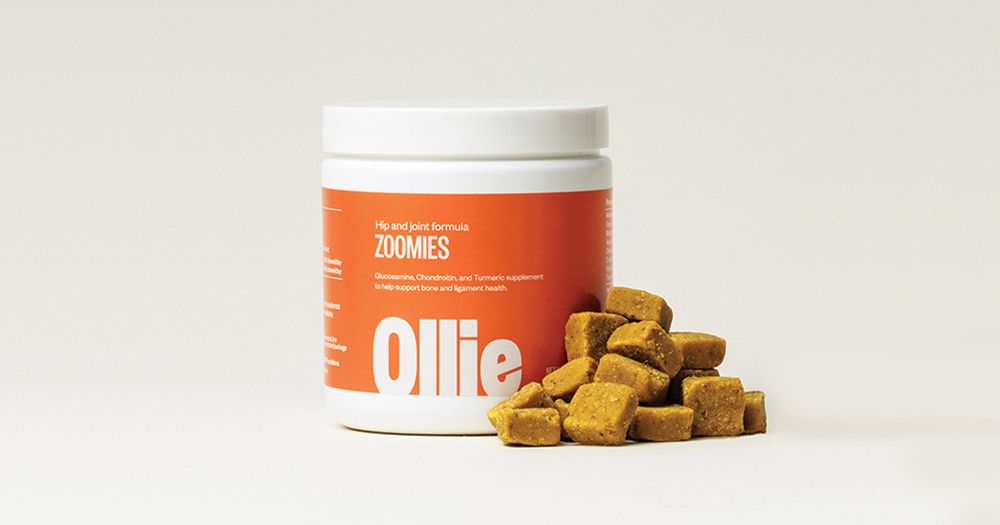Hey Ollie blog readers! We’re offering you an exclusive 60% OFF your starter box! Try now!
Chondroitin is commonly used to help dogs with hip and joint issues, including canine arthritis and hip dysplasia. You can find it along with glucosamine in many hip and joint supplements, as well as in some dog food targeted at senior dogs. But what are the benefits of chondroitin for dogs, and are there any risks to supplementing their diet? We’ll explore both the pros and cons of this supplement.
What is Chondroitin?
Chondroitin is a naturally occurring compound that is a vital part of cartilage and other connective tissue. It is frequently used as a dietary supplement for humans and dogs alike to help maintain and repair joints and relieve pain caused by inflammation or trauma. Animal cartilage is the only naturally occurring dietary source of chondroitin, though it can be synthesized from its glucosamine precursor.

Chondroitin for Arthritis
Chondroitin is often recommended by vets to treat osteoarthritis, a progressive and degenerative disease that affects dogs of all breeds. When paired with glucosamine, chondroitin has been shown to help reduce pain and increase mobility in the joints of dogs. Since chondroitin naturally promotes water retention and elasticity in cartilage, it helps lubricate joints and build and repair the tissue lining these joints.

Chondroitin for Hip and Joint Maintenance
If you only started researching supplements after your pup started showing signs of needing extra support, you’re not alone. More often than not, supplements are used as treatment rather than as a preventative measure or maintenance. That said, under the guidance of your vet, supplements can be beneficial to maintaining healthy functions in your pup, particularly if they are prone to certain health challenges. Certain breeds like Great Danes, mastiffs, pugs, and bulldogs have a higher risk of developing hip dysplasia, while other breeds like Labrador retrievers, golden retrievers, and German shepherds are more prone to arthritis. However, no dog is immune from hip and joint issues, especially those who have active lifestyles that put pressure on these areas. Starting a supplement early on could help reduce the chances of arthritis or dysplasia progressing over time and nip symptoms in the bud.
What Are the Side Effects of Chondroitin?
When taken in proper doses recommended by a veterinary professional, the side effects of chondroitin should be minimal. However, there are a few symptoms to be on the lookout for when adding this new supplement to your dog’s diet.
If you are already supplementing your dog’s diet in any other way, you will want to check with your vet that chondroitin or your hip and joint supplement is OK in conjunction with your dog’s current supplements, as some ingredients and vitamins can have adverse or competing effects.

How to Add Chondroitin to Your Dog’s Diet
Chrondoirton is most commonly found in over-the-counter supplements, either in chew, capsule, or drop form. It is almost always paired with glucosamine to optimize the benefits of cartilage production and repair. At Ollie, we pack both glucosamine and chondroitin into our Zoomies Hip and Joint formula. These soft chews are easy to feed or sneak into your pup’s meals or toys. Along with glucosamine and chondroitin, Zoomies are made with natural ingredients like turmeric to help support bone and ligament health, as well as reduce pain-causing inflammation.
When choosing a supplement for your pup, we always recommend selecting one that has been third-party tested. This unbiased testing ensures that all ingredients meet regulatory requirements and the highest quality standards.
The Ollie blog is devoted to helping pet parents lead healthier lives with their pups. If you want to learn more about our fresh, human-grade food, check out Ollie.com.
Tagged As:

The nutrition your dog needs,
the food they want.

Enjoying our articles? Subscribe our Newsletters and get new articles directly to your inbox
You might also like
21 July 2025
6 MINS READ
Can Dogs Eat Nuts? Which Nuts Are Safe & Serving Guide
Can dogs have nuts? Some nuts are fine in moderation, but others can cause serious harm. This quick guide breaks down which nuts are safe for dogs, which to skip, and how to feed nut butters respon…
18 July 2025
4 MINS READ
New Puppy Diet Recommendations for Healthy, Happy Growth
As a new pup parent, one of the biggest ways you can support your puppy’s long-term health is by providing the right nutrition. A puppy’s dietary needs are different from an adult dog’s, and…
by Ollie Pets
18 July 2025
5 MINS READ
How Human-Grade Dog Food Benefits Your Pup’s Health and Happiness
You’ve likely heard the term “human-grade” dog food, but what does it really mean, and is it worth it? Choosing human-grade food can be a significant investment for your dog’s long-term he…
by Ollie Pets







